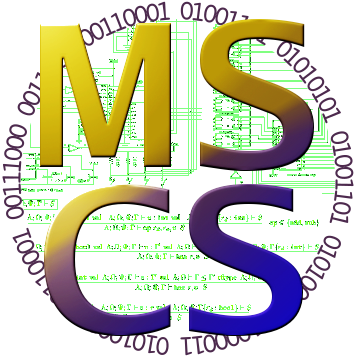
Object-Oriented Data Structures Using Java.
Nell Dale, Daniel T. Joyce, and Chip Weems.
Jones & Bartlett, 2018.
Fourth edition, ISBN No: 978-1-2840-8909-7
Readings will be regularly assigned from the textbook.
Lectures will assume that students have already read the assigned chapters, and periodic reading quizzes will be assigned in D2L.
This is a course on classical algorithms and data structures, with an emphasis on problem solving and implementation in modern programming environments.
Upon completing this course, students will be able to:
For those of you interested in curriculum details, this course will correspond to the following components in the Joint ACM / IEEE Computer Society Taskforce report, Computer Science Curricula 2013: Curriculum Guidelines for Undergraduate Degree Programs in Computer Science:
| Knowledge Unit | Hours |
|---|---|
| Algorithms and Complexity (AL) | 16 |
| Discrete Structures (DS) | 4 |
| Parallel and Distributed Computing (PD) | 2 |
| Software Development Fundamentals (SDF) | 17 |
Student grades will be assigned based on evaluation of the following:
Grades will be assigned using the standard formula: A: [93, 100]; A-: [90, 93); B+: [86, 90); B: [82, 86); B-: [78, 82); C+: [74, 78); C: [70, 74); C-: [66, 70); D+: [62, 66); D: [58, 62); F: [0, 58)
At the instructor's discretion, grades may be "curved" up; grades will not be curved down.
Grades will be routinely posted in the gradebook on the course D2L site, as they become available.
Student attendance will not be explicitly tracked in this course, and will not directly impact student grades. However, students who routinely miss class discussions or lectures should expect to be unprepared to complete the assignments and exams upon which grades so heavily depend. In short, I don't bother with attendance bean-counting because students who cut class usually fail themselves out of the course before I would need to take any action. Make good decisions.
If you know you will be missing class for a legitimate reason, I appreciate a heads-up, but in accordance with Marquette University Attendance Policies, I neither require nor accept documented excuses, except in those specific cases detailed in the policy above. Please try to have a peer in the class take notes in your absence, and get any assignments in ahead of the deadline.
The size and structure of this course will not normally allow me to accept late work under any circumstances. There are enough opportunities for points in the course for most students to miss a few without severe consequences for their grades.
All students are expected to abide by Marquette University's Policy on Academic Integrity, and we will proceed under the assumption that everyone has committed themselves to the University's Honor Pledge:
I recognize the importance of personal integrity in all aspects of life and work. I commit myself to truthfulness, honor, and responsibility, by which I earn the respect of others. I support the development of good character, and commit myself to uphold the highest standards of academic integrity as an important aspect of personal integrity. My commitment obliges me to conduct myself according to the Marquette University Honor Code.
The Honor Code has particular implications for computer scientists and engineers, as well as computing professors, whose course work is so readily duplicated and shared in our modern digital world.
For my part, I will strive to ensure that your assignments and exams are engaging, challenging, and worth your investment in time and energy. For your part, I expect you will work hard, strive to learn, and present your work with honesty and integrity.
There will be many opportunities for you to collaborate with your peers in this course, and I strongly encourage you both to seek help when you are stuck, and to share your knowledge with your peers when you have achieved understanding. Problems will only occur if you falsely claim work as your own when it is not, or collaborate when an exam or assignment has been specified to be individual work.
In the unlikely event of an academic integrity violation in this course, Marquette University's Procedures For Incidents of Academic Dishonesty will be closely followed.
| Week | Topics | Readings | Assignments |
| 01 | Getting Organized, Big O | Ch 1 | Warm Up Project |
| 02 | Abstract Data Types | Ch 2 | Written assignment: Big O |
| 03 | Stacks | Ch 3 | HelpDesk Project |
| 04 | Recursion | Ch 4 | Percolate Project |
| 05 | Queues | Ch 5 | Percolation Variations |
| 06 | Collections | Ch 5 | Queues |
| 07 | Lists | Ch 6 | |
| 08 | Midterm Exam: Chapters 1-6 October Break |
||
| 09 | Binary Search Trees | Ch 7 | Lists |
| 10 | Maps | Ch 8 | Trees |
| 11 | Priority Queues, Heaps Start Final Projects |
Ch 9 | |
| 12 | Graphs | Ch 10 | Maps and Graphs |
| 13 | Searching and Sorting | Ch 11 | |
| 14 | Advanced Topics Thanksgiving Break |
Sorting and Searching | |
| 15 | Final Projects | Final Projects | |
| 16 | Final Exam: Chapters 1-10 |
[Revised 2018 Aug 27 00:08 DWB]